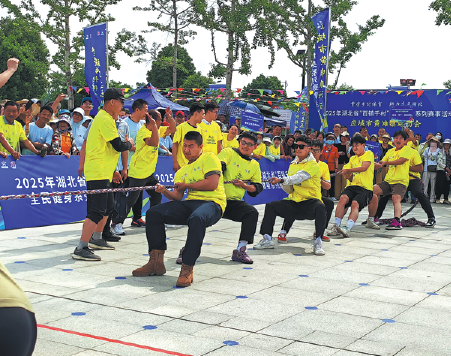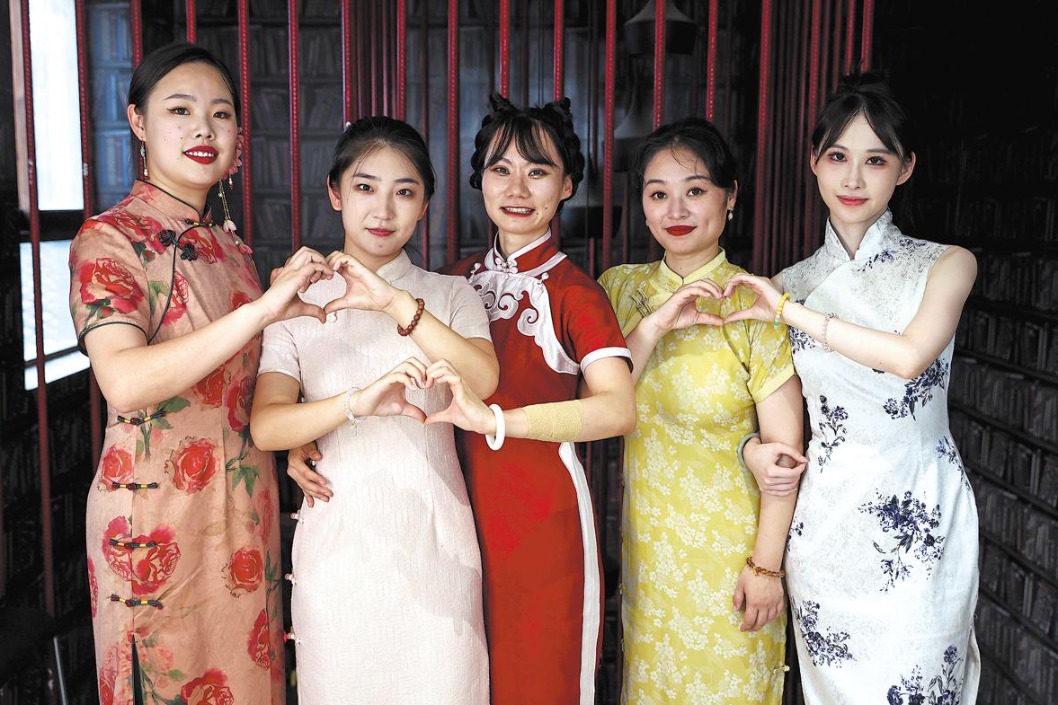Village sports create economic buzz in Hubei

WUHAN — When Hu Rui's team clinched victory in the tug-of-war finals in Central China's Huangtan town in Hubei province, their prize was not a medal, but something far tastier: 5 kilograms of soft-shelled turtle, 10 kg of crayfish, a bundle of fresh vegetables and a couple tins of local green tea.
"That's what victory smells like," said Hu, a physical education teacher from Yingcheng Huamao Foreign Language School, while holding up the prize on Wednesday.
Over the past two days, the small town of Huangtan transformed its Xingfu Park — or Happiness Park, in English — into a buzzing arena of grassroots sport and local pride. With 40 teams competing and thousands of villagers watching, the town's first-ever sports festival was turned into a grand carnival.
From tug-of-war showdowns to three-legged races and square dances, the event drew people of all ages. Farmer Fu Xin, usually knee-deep in spring crops, took a break from his fields to train for the 4.5-kilometer run a month ago.
"I had to represent our village with dignity," he said while catching his breath at the finish line.
The tug-of-war final stole the show. Spectators packed around the enclosure, cheering loudly as teams pulled the rope with all their strength. In the end, Hu's squad of seven young PE teachers edged out a farmers' team led by 61-year-old Chen Qinming.
"We knew that we were more competitive than other villagers, but we still chose to participate in all events, because we want to promote a healthy lifestyle to more people," Hu added.
Undeterred, Chen jumped straight into his next event — a heated table tennis match against another teacher from Yingcheng Huamao. He narrowly lost 13-15 in the deciding game, but beamed with pride.
"He's 30 years younger than me, but we seesawed back and forth for quite a while, which made me feel that I'm still young," Chen said.
For Huangtan, this was not just fun and fitness — it was also smart economics. Nearly 3,000 spectators visited the square on the first morning, and beside the sports field, 35 local vendors set up booths, offering everything from handmade soy sauce to fresh tomatoes.
"It was nonstop," said Li Xiaoping, who helped run the Huangtan soy sauce booth. "We sold almost 80 kg of fermented bean sauce within the first half hour. People were drawn in by the games, and stayed for the flavor."
The town's mayor, Li Dekui, could not have been happier.
"This kind of event brings people together, and it also boosts our economy," he said, adding that Huangtan prepared to turn such a sports gala into an annual tradition — possibly expanding with dragon boat races and more community festivals.
With the booming of rural sports events, such as the Village Super League and Village Basketball Competition in China in recent years, a growing number of small towns have turned to sports to achieve social governance goals as well as boost tourism and the economy.
The sports festival in Huangtan was also the opening act of Hubei's provincial fitness campaign — an initiative that will bring over 200 sports events to 40 towns and streets across the province this year.
The strategy is clear: use the power of grassroots sports to spark broader gains — in public health, tourism and local industry.
"We want to turn the flow of spectators into real economic uplift," said Yan Hanhua, director of the Hubei Provincial Social Sports Management Center.
For towns like Huangtan, it is already working.
"It's great to see that local villagers are exercising more, talking less about mahjong and more about matches," Li said.
Xinhua

Today's Top News
- China to open its door to foreign investment wider
- China criticizes Canadian tariffs on products containing Chinese steel
- US legislative chaos undermines its democracy
- Why China is irreplaceable in supply chain
- China's FDI inflow tops $700b since 2021
- Australia, China set to bolster steel partnership






























